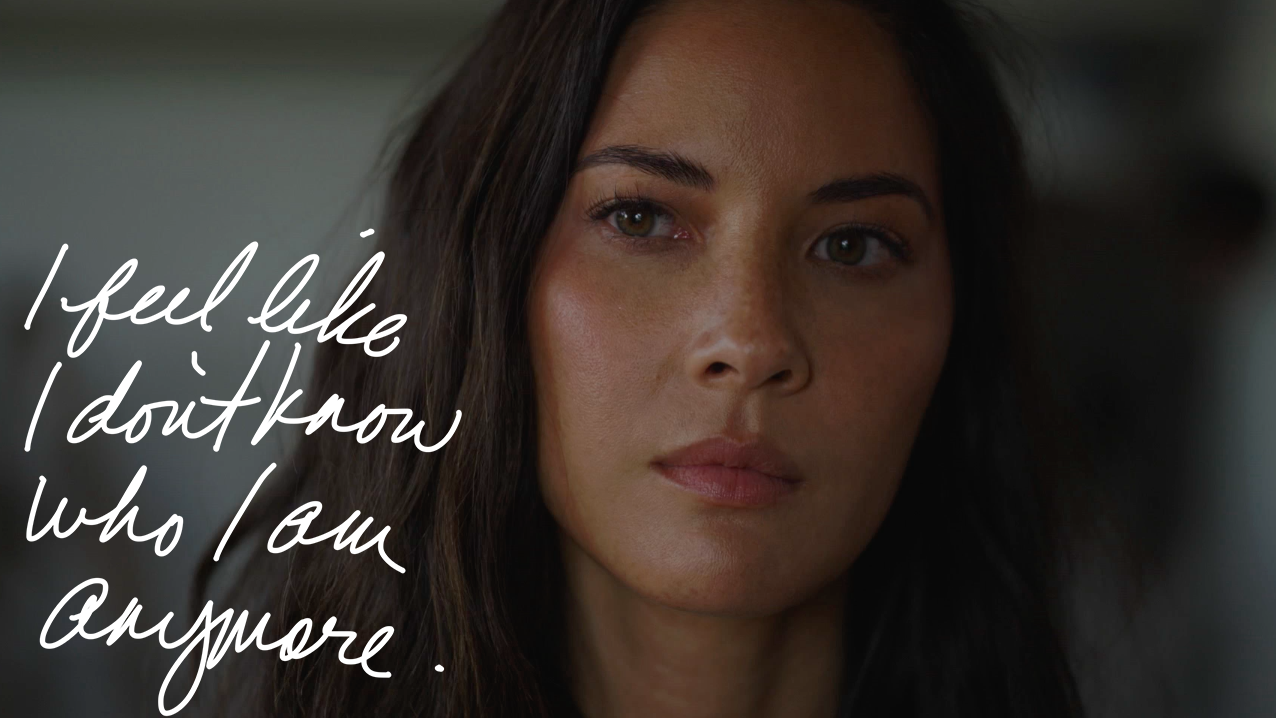Violet, Justine Bateman’s often sharp commentary on a certain side of the movie business, suggests what might have happened if the protagonist of Kitty Green’s The Assistant decided to stay in her toxic work environment for the rest of her career. Stuck in a different kind of development hell, Violet (Olivia Munn) is a production executive working for an independent producer Tom (Dennis Boutsikaris) who expects her to leverage all manner of her personal life to get the job done. Living with life-long friend Red (Luke Bracey), a screenwriter blacklisted by Tom, she has been guided by a menacing conversation in her head she calls “the committee” (voiced by Justin Theroux) who serves as a gatekeeper between her reality and true happiness. The voice casts self doubt which is sometimes, but not always, contradicted by hand-written notes that appear over the image on screen.
Demystifying the backroom deals of film financing, Bateman has crafted an authentic-looking and -feeling commentary on show business designed perhaps to make the kinds of acquisition professionals and insiders who attend festivals and film markets uncomfortable. For a general public less compelled by such inside baseball, Bateman’s film is often a fascinating experimental psychological thriller given weight via its authenticity.
Violet is terrific at her job even though she’s spent second-guessing herself as a talented mid-career executive juggling work, her social life in Los Angeles, and her abusive family back in Michigan. The voice of the committee grows even louder after a chance encounter with ex Martin (Simon Quarterman) who shares the kind of baggage young career-consumed professionals do when trying to settle down early in life. Years prior she burned their apartment down after listening to the committee convince her leaving lit, unattended candles on a wooden bookshelf was a good idea.
Munn’s character confides in another life-long friend, Lila (Erica Ash), finding herself surprised to learn not everyone has a committee in their head. Lila’s best advice to Violet is to simply “don’t cast yourself in a part you don’t want to play anymore,” therefore giving her free reign while navigating her attraction to Red, telling off her boss, and making the poetic art film she’s been hoping for years to green light on her own terms.
Violet walks a fascinating formal tightrope that is reigned in mostly by a terrific performance by Olivia Munn. A bold, yet imperfect directorial debut for Bateman, she is taking quite a formal leap that doesn’t always work by literally drowning its surface images in a sea of red, high pitch music, text, and voice at times.
The film industry can be vicious at all levels, and having come from an abusive past and aware at some level of her agency, Violet fits in well even if the voice in her head tries to convince her otherwise. As the industry has recently seen, some optimistic trailblazers like Violet have had a minor impact on making what was an all-boys club slightly more humane. Ultimately, Violet can often feel simultaneously feel over the top and a playfully provocative challenge to generate empathy for someone who on the surface seems like a quintessential “Hollywood elite.”
Violet premiered at SXSW.

